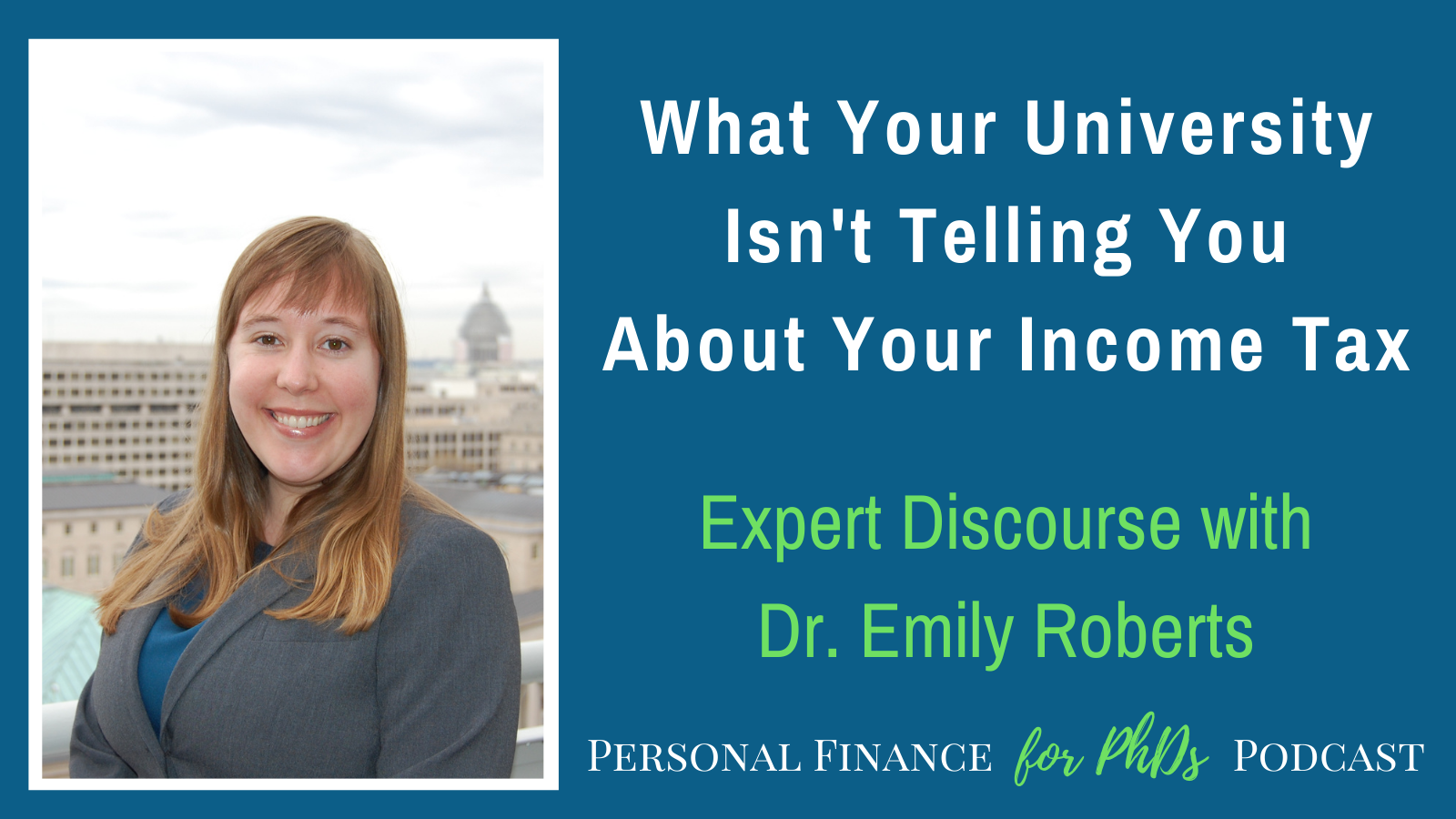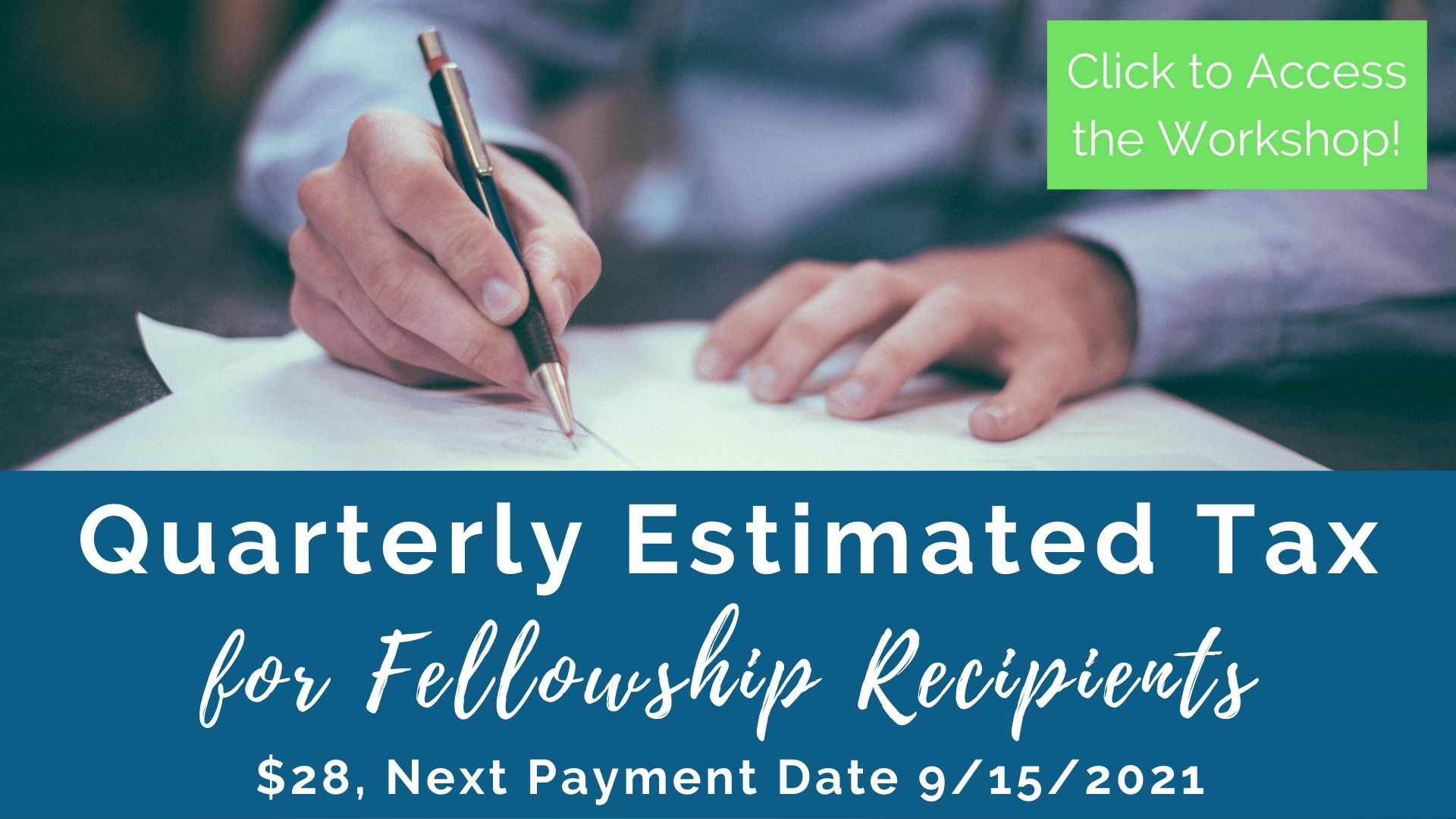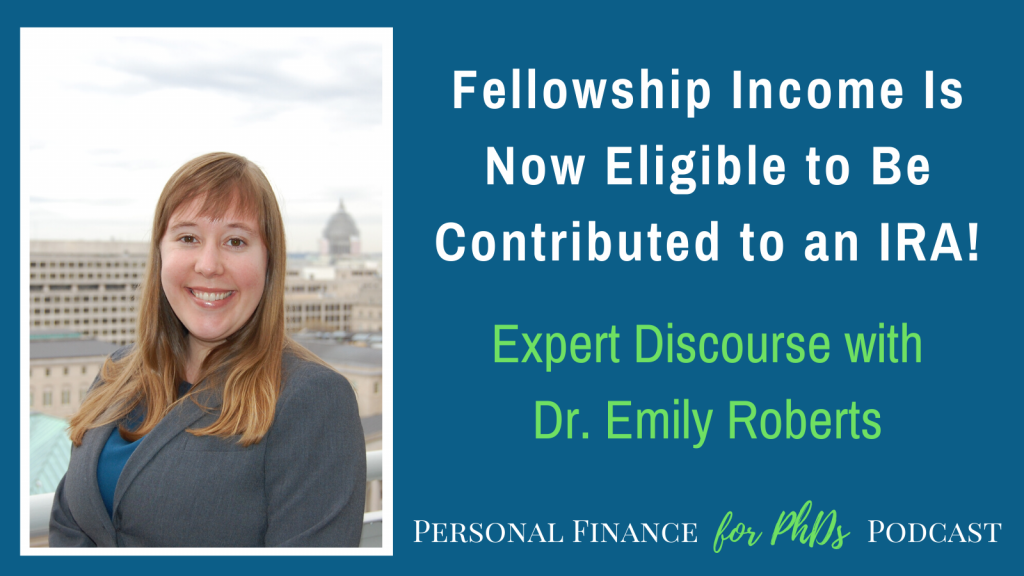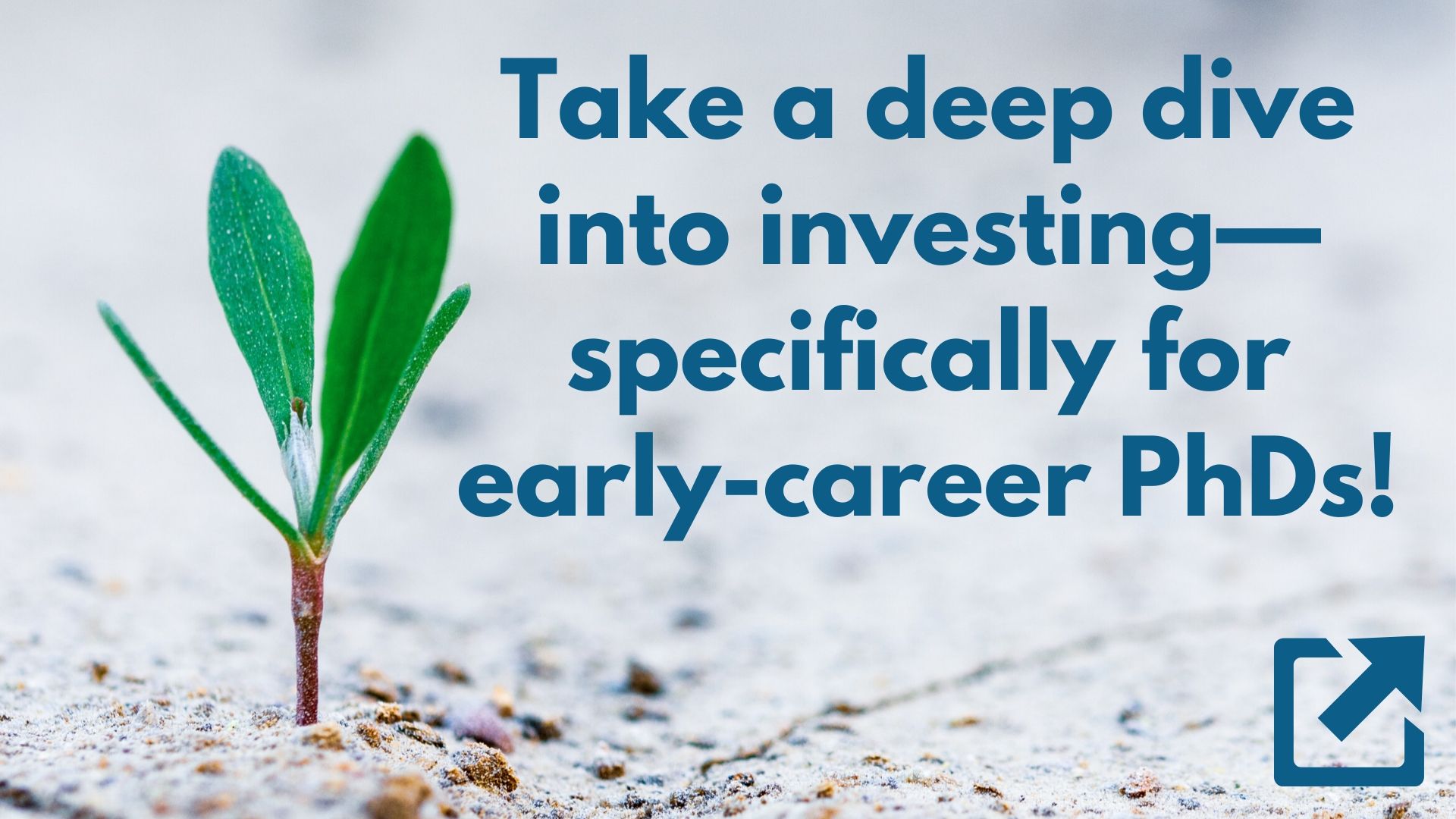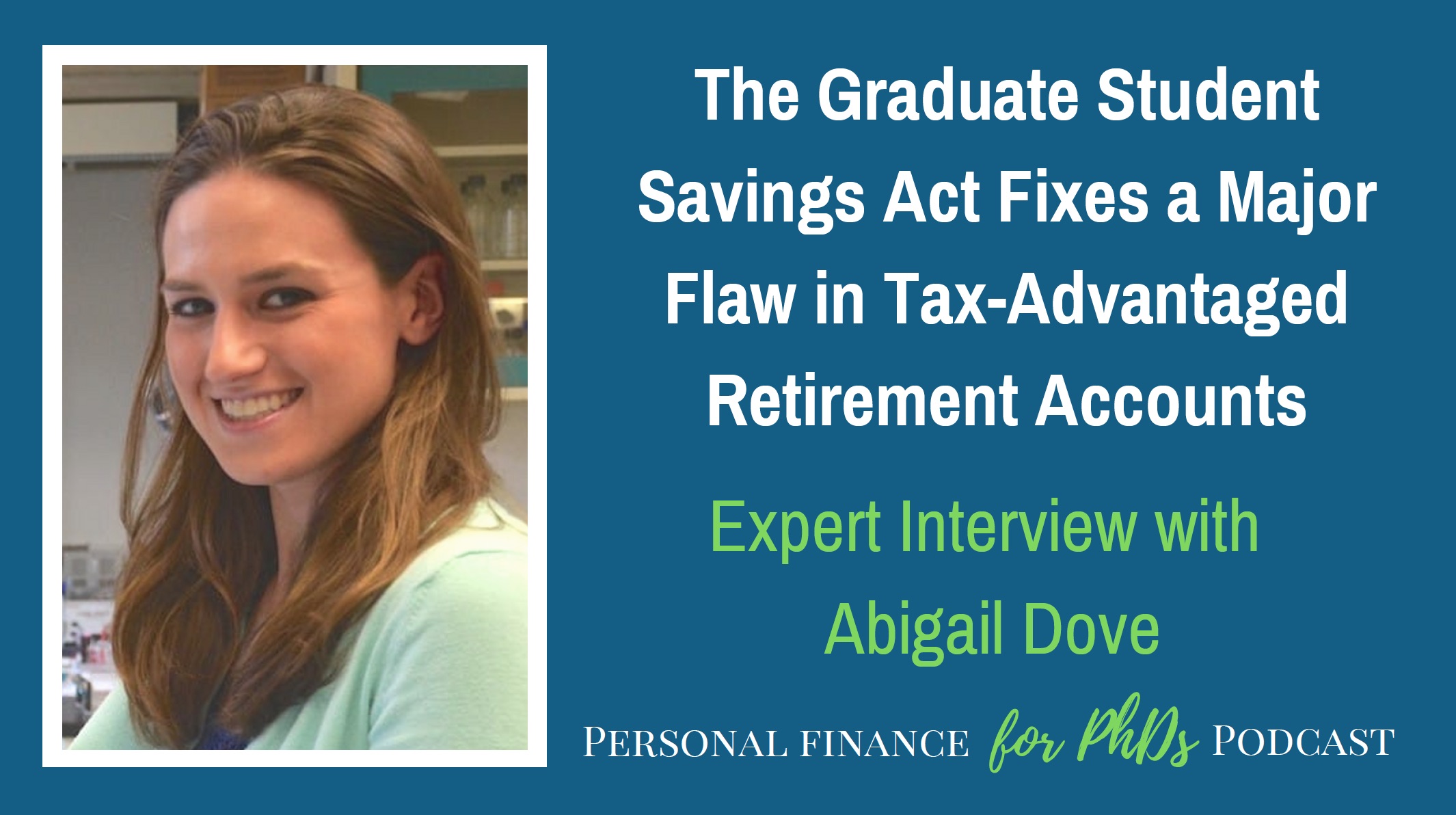In this episode, Emily interviews Georga-Kay Whyte, a first-year graduate student in history at Brown. Georga-Kay is a first-generation college student from Jamaica who grew up with financial insecurity, which spurred her to set a high bar for the financial support she expected from her graduate program. Georga-Kay was just as forward-thinking as she evaluated her housing and transportation options for her first year at Brown to set them at a reasonable level for her stipend. However, once she started living the grad student life, she realized she was overspending, especially on groceries and Amazon. She shares how she worked through her financial anxiety to confront her spending and start to budget. Finally, Georga-Kay details her financial goals for her 20% savings rate going forward. This episode is a must-listen for anyone with an upcoming career transition or move, especially if it’s your first!
Links Mentioned in the Episode
- PF for PhDs Tax Center
- PF for PhDs S14E8 Show Notes
- PhD Stipends
- PF for PhDs: Set Yourself Up for Financial Success in Graduate School (Workshop)
- Rocket Money (App)
- Mint (App)
- The Financial Confessions (Podcast)
- Her First $100K (Podcast)
- I Will Teach You To Be Rich (Book by Ramit Sethi)
- You Are a Badass at Making Money (Book by Jen Sincero)
- Georga-Kay Whyte’s Website
- PF for PhDs Subscribe to Mailing List (Access Advice Document)
- PF for PhDs Podcast Hub (Show Notes)
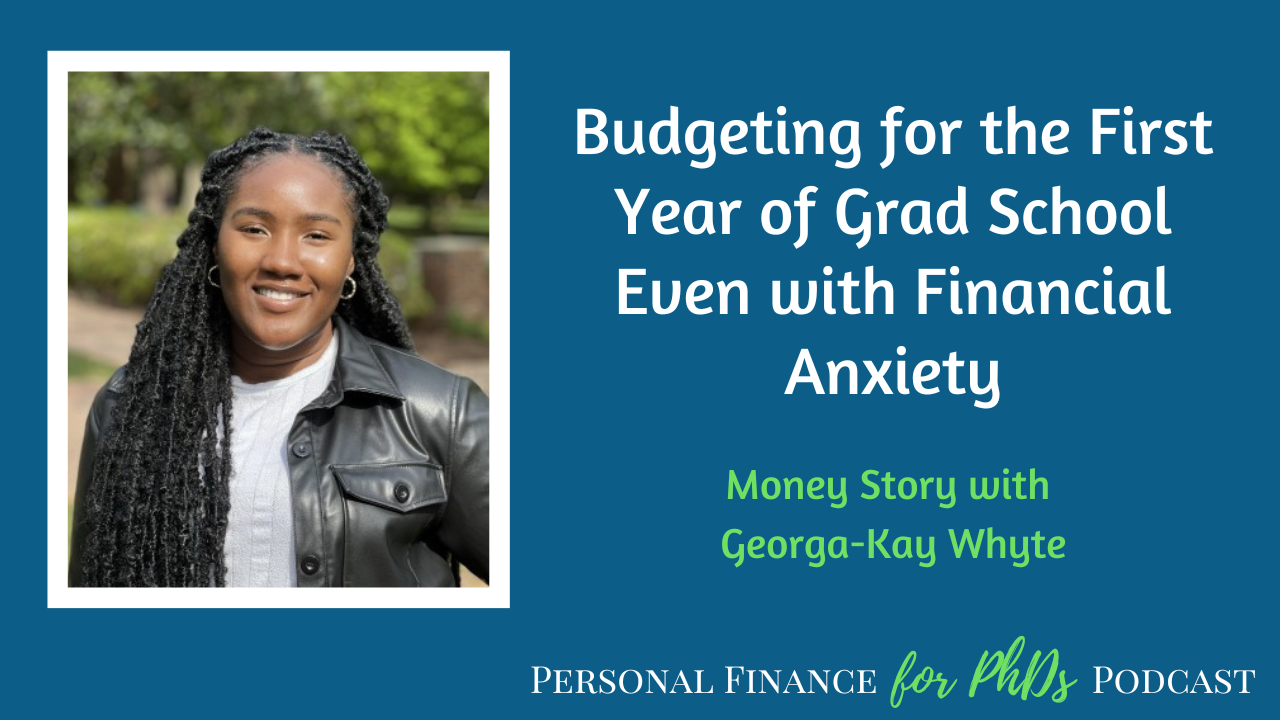
Teaser
00:00 Georga-Kay: There’s so much like financial literacy that we don’t have as graduate students because it isn’t prioritized. And so, the best way to sort of break that barrier is to talk to other people who are in similar situations. And that’s how it’s helped me to approach a lot of the things that I do now and how I think about creating a budget or how I think about my lifestyle. So, I highly recommend just reaching out to your community and starting those conversations. It helps a lot.
Introduction
00:31 Emily: Welcome to the Personal Finance for PhDs Podcast: A Higher Education in Personal Finance. I’m your host, Dr. Emily Roberts, a financial educator specializing in early-career PhDs and founder of Personal Finance for PhDs. This podcast is for PhDs and PhDs-to-be who want to explore the hidden curriculum of finances to learn the best practices for money management, career advancement, and advocacy for yourself and others. This is Season 14, Episode 8, and today my guest is Georga-Kay Whyte, a first-year graduate student in history at Brown. Georga-Kay is a first-generation college student from Jamaica who grew up with financial insecurity, which spurred her to set a high bar for the financial support she expected from her graduate program. Georga-Kay was just as forward-thinking as she evaluated her housing and transportation options for her first year at Brown to set them at a reasonable level for her stipend.
01:28 Emily: However, once she started living the grad student life, she realized she was overspending, especially on groceries and Amazon. She shares how she worked through her financial anxiety to confront her spending and start to budget. Finally, Georga-Kay details her financial goals for her 20% savings rate going forward. This episode is a must-listen for anyone with an upcoming career transition or move, especially if it’s your first! If you’re listening to this episode the day it’s released, you know that tomorrow is the filing and payment deadline for your 2022 tax return as well as the payment deadline for your quarter 1 2023 estimated tax. If you haven’t yet cracked the code for your grad student or postdoc taxes, there’s still time to receive my help! Go to PFforPhDs.com/tax/ and sign up straight away for the appropriate workshop for you. The workshops are asynchronous, so upon registration you’ll have immediate access to all the video modules with transcripts, worksheets and/or spreadsheets, and recordings of previous Q&A calls. Best of luck finishing up! You can find the show notes for this episode at PFforPhDs.com/s14e8/. Without further ado, here’s my interview with Georga-Kay Whyte.
Will You Please Introduce Yourself Further?
03:04 Emily: I’m so excited to have on the podcast with me today, Georga-Kay Whyte. She’s a first-year graduate student at Brown, and our subject today is budgeting and what she’s learned as a first-year graduate student about that topic. So Georga-Kay, would you please introduce yourself a little bit further for the audience?
03:20 Georga-Kay: Yes! First, thank you for having me. My name’s Georga-Kay, I’m a first-year history PhD student at Brown University. I study 20th century African American labor history and I’m actually first-gen Jamaican. My parents are immigrants. We all migrated to the U.S. And so, I sort of like had to figure out not only personal finances in terms of like living in a new country but also personal finances because like I didn’t grow up with a lot of personal finance talk in my family. So yeah, that’s just like my background.
03:51 Emily: Okay, so you get the multiple first-gen labels, right? Like you get first-generation American, I don’t know about first-generation college, necessarily.
03:58 Georga-Kay: I am first-gen in college as well. <Laugh>, first-gen graduate student, first-gen everything.
04:02 Emily: First-gen grad student, we got it all. Okay, that’s wonderful! And what age did you come to the U.S.?
04:08 Georga-Kay: I came to the U.S. actually right before I turned 18. So, I was pretty, yeah I was, I was much older.
04:13 Emily: Very new.
04:14 Georga-Kay: Very new to the U.S., yes.
04:16 Emily: Yes. And where did you go to college?
04:18 Georga-Kay: I went to college at Agnes Scott College in Decatur, Georgia. It’s a small women’s liberal arts school.
Money Mindset at the Start of Grad School
04:24 Emily: Yeah. Okay. So, wow. Okay, this first question that we have, what was the state of your finances and your financial background and money mindset coming into graduate school? So really we’re talking about what you grew up with in Jamaica, and then also just that short time you had in college. Yeah. So what was going on both in your finances and your like money mindset by the time you entered graduate school?
04:47 Georga-Kay: Yeah, so I grew up, I would say like relatively low income. In Jamaica, like I would be considered mostly like middle-class but in the larger scheme of things I grew up with a lot of financial insecurities. So, I had like an anxious sort of relationship with money from like childhood. And so, once I was coming into grad school I was super anxious about it because I had just started like looking online and seeing like the discourse around grad school and grad students being like they’re underpaid and they’re not like happy with their financial situation. And coming from someone who’s first-generation, I didn’t have a lot of financial safety nets. Like I just know that if anything, I’d have to figure it out on my own. And so yeah, definitely once I was like deciding to go to graduate school, this was before I found out about like what schools I’d be going to when I was thinking about like applying, I was like, “Oh my god, is this going to be the worst financial decision of my life to do this right at this time?” Because I came straight from undergrad, so I didn’t have a lot of time to like build up savings and stuff like that. But I really knew that I was passionate about the topic so I was like, I’m going to do this, hopefully it works out. Hopefully I can get a stipend that’s like livable. And that was my number one concern. I wanted a stipend that I wouldn’t be in a financially precarious situation just because I’ve already experienced so much like financial turbulence that I wanted some sort of safety net.
Role of Finances in School Selection
06:04 Emily: Absolutely. That makes so much sense. So, I want to talk a little bit more about maybe application and admissions process. You, I mean as anyone would be, were very nervous seeing the discourse currently going on, rightly so, about how difficult graduate school is financially. And all the unionization movements and so forth. So like, tell me about like the schools that you chose to apply to, were finances on your mind? Let’s talk about that. Like the selection process of where to apply.
06:31 Georga-Kay: Yeah, so I was super selective about the schools that I applied to, and I sort of feel like I was really naive in a way, but it worked out right <laugh>? I was like I’m going to apply to mostly private schools because they tend to have higher stipends, unfortunately. I started looking, I actually used, I forget what the platform is called, but they publish stipends for students. I think you might know what it’s called.
07:01 Emily: Is it PhDstipends.com?
07:03 Georga-Kay: Yes. Is that a website that you run?
07:05 Emily: That’s mine, yeah.
07:06 Georga-Kay: Yes. Okay, okay. Yes. So, thank you for that because I actually used that website a lot. So I looked at the PhD Stipends and I was really serious about, “Okay like is this a stipend that’s livable?” And then I would go ahead and like look at the livability calculator to see like, “Okay, is this going to work?” And I ruthlessly took schools off my list if they weren’t in that like situation of like they had a decent stipend for the area. So even if the stipend on its face was like, you know, almost $40K and the livability like it’s in New York, it’s like okay that’s still not going to work. So I was very serious about that, and I ended up applying to nine programs. And those nine programs I felt like had really strong stipends and they had other benefits like health insurance and stuff like that that I was looking at, too.
07:52 Emily: So, you’re the first I think interviewee I’ve had on the podcast who answered that question in that way. Because a lot of people I talk to, of course by the time they get into admission season they’re thinking about the financial offers and so forth. But to back that up into application season, I mean this is actually what I teach in my workshop for prospective graduate students: Set Yourself Up for Financial Success in Graduate School, is it starts way back the summer before you apply even earlier than that, understanding the funding models, just like, I mean you said you were naive, but that is a very advanced strategy that you’re applying. So that’s awesome. Yeah to really think through like why bother applying to a place that you are pretty confident already is not going to support you sufficiently? And so to just, if you have programs that you know, make your list, that’s great. You don’t need to bother with the other ones who aren’t. If this is a priority for you, which it was for you. It’s not necessarily going to be a priority for everybody, but for you it was. So, I love that process.
08:48 Georga-Kay: It was really just my financial situation, like coming in with so much student loans. Like I felt a lot of guilt over the amount of student loans I had, and I knew I didn’t want to get any more student loans in graduate school. And so I was like, I need to find a situation that’s going to work out. And the reason why I say naive, just because talking to people about like the admissions chances in graduate school. So I was like, okay, I’m going to be selective but these schools are going to have higher competition. Because they do like, they have high stipends and people know about them and stuff like that. So that’s why I was like, okay, well hopefully I get it <laugh>, you know?
Considering Other Factors
09:19 Emily: Yeah. But applying to nine schools, that’s a pretty good number. I think that’ll give you a lot of chance. Anyway, it has worked out. So let’s talk about admission season. I don’t know how much you want to share about how many offers you got, but like, you know, did your expectations bear out? And the offers that you did get, yes, they were decent stipends? And then maybe you could share how much more finances, if at all, played in the decision of where to go or if you’d already done that filter early on, maybe it didn’t really have to.
09:46 Georga-Kay: Yeah, so I got three admissions out of the nine that I applied to. I got admitted to Penn, Brown, and Maryland. University of Pennsylvania, Brown University, and University of Maryland. And those offers were pretty good offers honestly. Especially looking at like the averages for stipends. So, I got $38,000 from Penn and then I got $45 from Brown. And I think Maryland offered like $32. I don’t remember specifically, because I knew almost immediately that Maryland had the lowest stipend. So I was just mainly considering Penn and Brown. And yeah, those were like comparable in some sense. Obviously like there’s still a discrepancy there between the amount that I got from Penn and the amount I got from Brown. It was actually a hard decision for me because the programs were both equally great, but then also the cost of living was relative. And I knew that like if I wanted to, I could have probably negotiated with Penn, which I didn’t end up doing, but I definitely still considered finances when I was thinking about it. But it was like close enough where I felt like, “Okay, well what else do I want from graduate school?”
10:51 Emily: Based on how you’ve talked about your thought process so far, and I’m pretty sure I know the answer to this question, but were you only considering your first-year stipend and like the source of the funding? Or were you also looking forward to like, were you being funded for five years or were there guarantees or you know, was it a TAship versus a fellowship? Like did you factor all that stuff into?
11:12 Georga-Kay: I factored everything in. When I got my offers, I reached out to the like DGAs of each department and I was like, okay, explain to me how this works <laugh>? I was just like, I wanted all my bases covered. So I talked to both schools and I was like reading through the offers and sort of seeing, okay, like first year, they were very similar. So it was like first year would be fellowship and then you would TA for some years and then you’d go back on fellowship. And both schools offered like five to six years of funding. Brown guaranteed six years, Penn basically they’re like, you basically will get six years but we’re guaranteeing five. And so, I knew that like throughout the program I would be funded for the entirety of it.
11:53 Emily: I’m so glad that you shared that as well. This is another thing that I encourage in my workshop is following up with the directors of graduate studies or maybe the admin in the department to like explain to you anything that’s not really clear, or maybe they’re only talking about the first year but they’re not talking about subsequent years. Like they’re recruiting you, okay? They want to convince you to make good on that offer that they just made you and convince you to come there. And so they should have pretty solid answers to these questions. And they might say, like Penn did, “Okay, you know, we’re not officially going to guarantee that sixth year, but you know, in nine cases out of 10, like we do find funding for you know, that sixth year or whatever.” Like they should be able to give you those really well-thought-out answers to those questions. So I’m so glad that you went through that process as well of really investigating.
Financial Expectations in Grad School
12:35 Emily: And you chose Brown, and that’s where you are now. So, let’s kind of talk I guess about now that you knew the stipend, you knew that maybe had some degree of confidence that the precarity was not going to be as much of an issue for you. What were your expectations then about how your finances would look in graduate school once you had that offer in hand?
12:56 Georga-Kay: Yeah, once I had the offer, I sort of felt a lot more secure just because like I feel like $45,000 is like a relatively, it’s not like anything crazy, but it’s average enough where it’s like, okay, in Providence I could live on that. And I think I could save on that, which was like a big deal because I know that like a lot of times in graduate school people talk about not even being able to save. And I wanted to be able to save and like achieve other financial goals. So, once I got that offer in hand, I started to think about, okay, well now what do I want to do? Like I know I’m going to make this much money. How much do I want to spend on rent? Do I want to keep like my costs low? You know, how much am I willing to compromise for the next few years–because I’m in my early twenties–to sort of set myself up for a good financial foundation?
13:39 Georga-Kay: And so those were just sort of all the questions that I had in my head. And then also, I started to think about like the realities of graduate school and what in cost that would incur as well. So, I like when I was going through my stipend and sort of backtracking a little bit, going through my offer, I would see that, oh I had like research funds and these funds, but I didn’t know until I sat down with the DGS and asked about it. I was like, “Is this money that would be like deposited into my account?” And they’re like, “No, it’s reimbursements.” And I was like, “Oh okay.” So then I had to learn about this whole reimbursement thing. So I was like, I have to actually have to have a safety net, like some sort of savings because if I want to pay for something I have to pay for it first before I get the money back. And so I started to think about that and just, yeah, just a lot of wheels turning now that I know that okay this is how much I’m going to make, how can I make this work in order to like pay for my day-to-day living expenses?
Housing and Rent
14:29 Emily: And one other thing, again, I’m talking about this workshop so much because this is the process you just went through. One other thing I talk about in this workshop is about the big decisions you need to make in your budget that happen probably before you even arrive at graduate school, right? You mentioned housing, so like did you commit to a lease for example, in advance of moving? Or is that something you were able to arrange once you got there? It’s very different, you know, different housing markets.
14:50 Georga-Kay: Yeah, so housing for me was one of the biggest things that I thought about because it was going to be my first time paying rent because I came from undergrad where I was like paying tuition and that would like cover, you know, my expenses. So, I wasn’t paying anything monthly. So moving to Providence and then also having to pay for moving expenses. I knew that like housing was going to be a big deal and I knew that it would probably be my biggest expense. And I had to make a decision about whether I wanted to live with roommates or I wanted to live alone and what does that mean? So I decided to live alone. I’m currently in graduate housing and the housing is somewhat subsidized. I don’t know if they say it’s subsidized on their website, but it’s like a lower cost of living apartment than I typically would be able to find in Providence, essentially.
15:32 Georga-Kay: And that was great. I started that <laugh>, luckily I started the process early so I was able to sort of like compare housing situations. I looked at the average cost if I wanted to live with a roommate in a house or if I wanted to live in a studio. I currently live in a studio and my rent is like, I feel like it’s on the high end of what I would want to spend, but I knew that I would appreciate that more having that sense of like security and that sense of not having to worry about if I have a roommate that maybe I don’t mesh with or you know, like there’s things that you have to think about lifestyle stuff. So I was like, okay, I know that I’m willing to pay a little bit more to live alone and keep my other costs low.
16:10 Emily: What I love about this model, I mean you’ve listened to the podcast, you know, I’m always like roommates, roommates, good idea. But what you did was you worked with your numbers and you knew that it was feasible, especially making that you know, decision to go with the on-campus option and so forth. I’m curious now we’re recording this in March, 2023, if you’ve already made a decision for housing next year? Or like are you going to keep the same situation? Do you think you’re going to do something different?
16:34 Georga-Kay: Yeah so I’m definitely, unfortunately the housing at Brown, they only guarantee it for two years. So I’m going to keep those two years. So I’m going to keep going until next year because I really love the area that I live in. I love my apartment, and so I feel like I really lucked out with housing. So, I’ll keep it and I probably will have to move after my second year since it’s not guaranteed and that it’s a really high interest area. Like a lot of students want to live here. So, I feel like after the second year I’ll be more comfortable in the area I can find somewhere else.
17:02 Emily: Yeah, and you might have met someone you really like enough to live with <laugh>.
17:06 Georga-Kay: That is true.
17:07 Emily: So, a roommate might be more feasible.
17:08 Georga-Kay: I’ve also considered that. Yes, I’ve thought about that too.
Transportation and Other Expenses
17:10 Emily: Yeah. So, we’ve already talked about kind of what I call the biggest rock in your budget, which is housing. And I’d like to know about your transportation choice. Like do you own a car or do you think it’s necessary? What is your choice there?
17:24 Georga-Kay: So, I decided to actually sell my car <laugh>. I sold my car before. When I was living in Atlanta, I bought a car used and it was a great car. It carried me to my like last two years of undergrad. But then I was like, I’m moving to the northeast. The transportation here seems a little bit easier. There’s a lot of public transit and there’s also trains and stuff. So, I talked to graduate students and they said that it would be fine to live without a car. So I was like, I’m going to use that money to move. And now I currently don’t have one and I rely on public transit, walking, and Brown has a university shuttle that’s actually really, really good and I’m able to basically spend like less than $50 a month on transportation costs.
18:06 Emily: Love that. Whenever it’s possible to live car-free, especially if when you’re pairing that with the campus housing, it’s like, I’m sure it’s really convenient and everything, you can just, not eliminate entirely, but dramatically reduce the costs associated with transit by getting rid of your car. Ugh, I have a car but I’m such a like anti-car person. <Laugh>, I live in Southern California.
18:26 Georga-Kay: No, I love living in a walkable city and that’s something I considered too. I was like, I wanted to, I knew that like if I’m going to be paying a little bit higher rent then at least if I don’t pay transportation, it kind of evens out.
18:37 Emily: Yeah, absolutely. So, we’ve talked about these major, major components of your budget, the housing and the transportation. And so I’m curious like how you formulated the rest of your budget, maybe more with the other smaller fixed expenses and other variable expenses? And then kind of what you’ve learned through living with that budget for the last, you know, six, seven months?
18:55 Georga-Kay: Really the things that I thought about was rent and transportation and then the rest of it was just sort of like I was going to do trial and error. So I was like, I don’t know what’s a reasonable grocery bill? I don’t know how much I should expect to, you know, spend, I also have a pet. And so that’s also a part of my budget. So I was like, I don’t know how much I’m going to be spending for vet bills. And so, I really just was like, okay, like this is less than half of my, like my total living expenses is less than half of my stipend. And so I was like, whatever the rest is, I’ll play around with the numbers. So when I originally started, I realized I was overspending because I just sort of didn’t want to look at it to be honest.
19:32 Georga-Kay: I was like, I’m going to take care of the big stuff. And because of my financial anxiety, I sort of had a lot of avoidance about money, especially when I just moved because I was like, “Oh my god, like am I going to, you know, completely throw off my budget or something like that?” So I was like, okay, I have this wiggle room essentially and we’ll figure it out. And so I started just shopping without caring. And then once I started looking back at my budget, which is something that I’m really happy I did, I started actually looking at my money. I was like, oh, maybe I’m spending a little bit too much on groceries. Like, and talking to other graduate students as well. I’ll get to this later, but talking to other graduate students and realizing, oh this is like an average cost for, you know, a meal for a single person, like a grocery bill for a single person, or this is the average cost for electricity or something like that. So I at first was avoidant, but then I started slowly having those conversations, started slowly thinking about it and then I started actually setting price markers like, oh I want to spend $300 on groceries. Oh, I want to spend this much on electricity. And then actually going in and doing those numbers and keeping track of that.
20:38 Emily: I think this process that you’ve gone through is so relatable. Absolutely. You don’t know how much you’re going to be spending on all these little variable expenses that aren’t like a contract that you’re entering into.
20:48 Georga-Kay: Yes, <laugh>.
Financial Discussions with Other Grad Students
20:49 Emily: When you first get to a new city and you have a new lifestyle different than the one you had before. So it definitely makes sense to just kind of work it as you go. And really, I’m actually very impressed you’re talking about having financial anxiety around this just six months ago and six months later you’re coming on a financial podcast? Like that’s a lot of progress in a short period of time. So I’m very impressed. How did you start having these conversations with other graduate students? Like, did you just come out and say, what’d you spend on groceries last month? Or like, what was it?
21:15 Georga-Kay: No <laugh>, no it wasn’t like that. I feel like I just started getting closer to the people in my program, but also just to people that I’ve met through school. And I like to think I’m a pretty forthcoming person. So if like we’re talking and everyone’s like, how’s your week been? And it’s like, you know, if there’s something on my mind, especially now that I feel like I have a close relationship with some of the people in my program I’ll mention like, “Oh my god, like I feel like I’m overspending on groceries,” which is literally something I did. I was like, I feel like I’m overspending on groceries, but I don’t know. And then all of a sudden everyone starts chiming in, like, oh, I think I spend this much. And then we all start comparing. We’re like, oh. And so I sort of like, I guess instigated the conversation, but now I feel like there’s so much more financial transparency between us all, like within my history cohort and we’ll share things now where it’s like, okay, do you guys think this is a reasonable amount to spend for this or something? And yeah, so I just feel like luckily I’ve always been open to sharing and I feel like sharing invites other people to share.
22:09 Emily: Absolutely. What you did there was like, you were a little bit vulnerable, you said, oh I have a little weakness or like something I’m unsure about, can you help me?
22:19 Georga-Kay: Yes.
22:19 Emily: And you like invited that feedback. And that allows the other person to like be the expert for a second, because they’re the expert in their own budget, right?
22:25 Georga-Kay: Yeah.
22:25 Emily: So like then they can help you and everybody feels good about it and like, oh man, that’s a wonderful like sort of pattern that you have established. I think that’s going to help you so much throughout your time in graduate school. I remember for example, not necessarily about groceries, but like just asking other people how much they spend in rent. Like, oh I really like your place. Like do you mind me asking because this is what I spend and like how much do you have? And that was a way that I found like a really great deal on housing. My friend was like, you wouldn’t believe it. I only pay such and such for this great place. You know? And so just having that, those open conversations, I feel like it’s easier among people who are all paid the same <laugh>, which I suspect probably everyone in your cohort is more or less like being paid the same, at least at the moment, right?
23:05 Georga-Kay: Yeah, we’re all paid the same. I do have an additional fellowship just a little bit, but yeah, we’re relatively all on like similar pay scale. And I also with the rent thing, like that was also a thing that we talked about was like, okay, well this is how much I pay for rent. This is how much we all pay for rent. And having those conversations, like especially for someone I think because I’m first-gen and I’m also like the youngest in my program that I’m like the baby and I’m like, I want to ask because like you guys have had a few more years of like, people have been in master’s programs, so I know like I feel like accepting that like I’m still figuring it out and not having any sort of pride about it of being like, oh I’m not going to share because you know, maybe someone will judge me. Just being like, hey, like you know, I’m figuring out and you’ve had some experience like what is your take on this? As you said, like they’re the expert in their budget and so people like to help in that way.
Commercial
23:55 Emily: Emily here for a brief interlude! You’ve heard me mention several times during this interview how Georga-Kay perfectly lived out the principles and strategies I teach in my year-long asynchronous workshop, Set Yourself Up for Financial Success in Graduate School. If you would like to take a deep dive with me into financial tutorials designed for prospective and rising graduate students, please check out PFforPhDs.com/setyourselfup/. The workshop modules that relate to the topics in this interview are:
- Stipends vs. Cost of Living
- Decipher and Compare Offer Letters
- Right-Size Your Necessary Expenses
- Prepare for Your Start-Up Expenses
To learn more about these modules and the structure of the workshop, visit PFforPhDs.com/setyourselfup/. I hope to see you inside the workshop and to help you set yourself up for financial success in graduate school the way Georga-Kay has! Now back to the interview.
Tracking and Budgeting
24:53 Emily: Okay, so you’re on the ground, you’re figuring things out, you’re using your cohort to kind of bounce ideas off of. I love that. Tell me about your actual practice of budging. Because you said at first you didn’t want to look at the numbers, but does that mean that you were actually tracking? Like there were numbers there that you were avoiding looking at? Like practically, what was happening with those numbers?
25:14 Georga-Kay: Yeah, so once I moved, I sort of had a little nest egg to move because I knew that I would need that money. Luckily, we did get a transitional amount. We got $2,200 so I knew I was going to get that as well. So I had like a number in my head, okay, this is how much I’ll need to move. And once I paid for my moving costs, there’s a lot of things I didn’t think about. So like how much furniture costs, buying a trashcan, buying a trashcan is so expensive. Like all of these little things I’ve never paid for before. And I quickly went over budget and had to put some of those things on a card. And that was the first time I’ve ever done that, which is like put expenses that I couldn’t afford on a card, and that gave me a lot of financial anxiety as well.
25:52 Georga-Kay: And so once I did that I was like, I don’t want to look at this, I don’t want to know how much I have to spend because some of this stuff was like necessary expenses and I knew that once I started getting like regular stipends I could like then start thinking about it more critically. But in the first like month or two I was just like, I knew I was spending and I knew I wasn’t overspending, but I was definitely spending very close to like the borders of my budget I guess. My budget being the amount that I know that I make per month, that’s sort of like what I had in my head is like this is how much you make, this is how much you have to spend on your actual, like as you said, like the things I have to spend like contractually.
26:30 Georga-Kay: But everything else I was like okay, I’m going to spend and hope I don’t go over. And so I wasn’t looking at it. I wasn’t looking at it. I was just spending and not looking. And then after I would say about October, I downloaded Rocket Money, which is this app, I don’t know if you’ve ever heard of it, but it’s just like, it’s sort of like a Mint. If anyone’s familiar with Mint and they do like roundups, essentially. They tell you this is how much you spent on restaurants, this is how much you spent on Ubers this month and whatever. And so that was my first step into like, okay, what am I actually spending per category here? And then I saw the numbers, I was like, oh God, you know? And once I saw those numbers and I didn’t have to do a lot for it, I feel like that also is like something I would recommend if you’re scared about it and you don’t want to actually sit down, like go line by line, having some sort of like app that does it for you. It’s just like all I had to do was open, put my bank account in, open it and then just be like, okay, what is here? And so I looked at it and I was like, this is how much I’m spending per category. And then I started to think about changes that I might want to make in the future.
Frugal Measures
27:30 Emily: Yeah. Can you give some examples of what those changes were having realized that you were, your spending was a little bit too high? Like what were some, I would probably call it frugality, but what were some frugal like measures you started taking?
27:42 Georga-Kay: Yeah, so the spending that I saw was like mainly Amazon, which is <laugh>. I feel like people can relate to that. I was overspending on Amazon because I was constantly being like, oh I need to get this for my apartment because I had just moved and I realized, oh I don’t have like you know, I really want a toaster or something like that. Things that I didn’t need in the moment. And so I was like spending this much on Amazon, but I was doing it like in singular expenses, so I was never tracking how much I was actually spending and I wasn’t thinking about the cash flow of like, maybe I should wait a week or two until I get my next stipend to pay for this as opposed to like buying everything at once. And so I was just like not paying attention to it.
28:20 Georga-Kay: So once I saw it I was like, oh, I’m spending like $500 on Amazon, that’s like so much money. And then I was like, okay, I need to plan out what are the essential things that I need right now for my apartment since I just moved. Everything else will have to wait. And then also I looked at groceries, which I’ve mentioned a few times before and I was like, oh, I’m spending this much on groceries. I was spending like over $350 on groceries and I’m a single person and I wasn’t even eating that much. And I was like, that seems like a lot of money to me. And so I asked people and people were like, oh, like I actually spend like $300 or a little bit less than that on groceries. And then I realized it was because I was shopping at the more expensive grocery store. And I didn’t know, because I didn’t like shop around. I was like, this is the closest grocery store to me, so that’s what I’m going to go to. But literally if I just went in a like one that’s like a little bit further away, I found cheaper groceries and so I was able to get the same amount of groceries for a little bit less. And so yeah, those were the things that I realized once I looked at the numbers.
29:13 Emily: This is so relatable to me personally. And also I think the audience generally just, yeah, it’s a transitional time when you’re starting grad school and you don’t know the place to shop yet. And you do need, well need is a relative word. You want to have some things for your new place. And so it sounds like it was a combination of like finding some more frugal tactics to apply, and then also just really the proactive aspect of budgeting. You know, you were doing the reactive, the retrospective aspect, which is like looking at where your money had gone. And then you started adding in the, okay, well I only have, you know, available this amount of money for you know, discretionary Amazon purchases so I’ve got to keep it to that limit and anything else will have to wait for the next pay cycle and you know, we refill the coffers. Is there anything else that you’d like to add about that practice of budgeting?
30:02 Georga-Kay: I would say once I started doing like the automated where it was like the app was tracking it for me, then I actually sat down and like made an actual budget. Like I was like okay, this is how much, not like what the thing is telling me that I should spend based on my previous expenses, but based on my goals, like my savings goals, how much should I reasonably spend? And then that actually made me cut back a little bit more because I was like, oh, if I want to save up an emergency fund, then I can’t be spending this much on you know, eating out or something.
Resources for Budgeting
30:31 Emily: Yeah, I want to get back to those financial goals in just a minute, but before we do, so you said that you had some resources that you’d like to share about, you know, how you’ve learned about budgeting, how you’re practicing budgeting. You mentioned, I’m going to say Rocket Mortgage, that’s like the ads that I hear for them, but Rocket Money, is that the name of the budgeting app?
30:49 Georga-Kay: Yes, Rocket Money is the one that I started with. I’ve actually, in college I tried to use Mint because everyone was like, oh, Mint is a great app and I think it is a great app, but I quickly realized the interface just wasn’t like super user-friendly to me it was just, it was a little bit clunky. So I stopped using that and mainly also because I was just scared to budget at that point as well. It’s taken me a while to get into proactively looking at my money. And so Rocket Money has helped me to do that because it’s been like a really simple interface and once I put in my stuff it just sort of gave me all the numbers that I wanted to look at. And I would say also a lot of personal finance podcasts, which obviously this one I listened to, which I think is really, really helpful because there are just some things as an academic that like other podcasts will be like, oh you need to focus on, you know, negotiating for a raise or things like that.
31:37 Georga-Kay: And it’s like, okay, that’s not super practical to the life I’m going to be living for the next few years. But in terms of podcasts, I love The Financial Confessions. I feel like it talks a lot about like the social life of money, like money with friends and money and relationships, which I think helps a lot. I also like the Her First $100K podcast, which is like, I feel like that’s a pretty popular one, but it’s like Women in Money and thinking about how we perceive money, which is a lot of these podcasts are actually thinking about like how we think about money, how we use money on a daily basis. And then books. I love books I feel like as academics, like of course like my first sort of introduction to finance was through books. So I Will Teach You To Be Rich, which is a very popular one.
32:19 Georga-Kay: But also Jen Sincero’s, How to Be a Badass With Money [You Are a Badass at Making Money]. I think that’s the title of the book.
32:26 Emily: Yeah, I’ve read that as well.
32:27 Georga-Kay: That one really, yeah, that one is really good. I know people have mixed opinions on it, but the reason why I personally enjoyed it is because it’s sort of like allowed me to think about the ways that I talk about money to myself in ways that I didn’t really think about before. Because as I mentioned a lot that I’ve had anxieties around money and so I would just sort of be like, oh, like in college, like I’m so broke or I’m so this and like a lot of negative money talk and I’ve stopped doing that and I think having done that for a few years now and sort of reframed the way that I think about myself and my relationship with money has allowed me to make these like larger steps towards being like more financially competent.
33:02 Emily: Yeah, I noticed in those books that you listed, there are a lot of money psychology, like aspects there. It’s not, and that’s the hard part, right? Like the hard part is not necessarily the math <laugh>, like it’s not like the addition, subtraction, multiplication. It’s not the facts of like, okay, do I have access to an IRA or not? I mean I talk about that because it’s a little wonky, but like once you know, you know. The psychology part of it is the one that you need to work on over a time and it’s like you’re never really done with it <laugh>. You’re always evolving to like a new level with it. So, I like that you mentioned those like for that reason specifically. Yeah, any other resources that you’d like to add to your list?
33:41 Georga-Kay: I would say, I don’t know if this really counts as a resource, but what I mentioned previously, which is talk to graduate students. Like talk to graduate students, preferably graduate students are in a similar department to you or in a similar field to you because then you can get like ideas about, you know, the decisions that you can make that might help you in the future. Like just like daily living expenses. As you said, like maybe talking to them about apartments you might find a great deal or something. So I found that actually some of the best like resources have been like the other students in my department and students at Brown.
34:14 Emily: What I love about that suggestion is just that you’re going to get the most relevant information from the other people who are living that similar life to you. Like for me, like I work on a national level, so I do not get to be an expert in every single different state in every single different city. And so, sometimes when I go to speak at certain universities, I ask the people who are living it, like for their suggestions, like I can say some things that work generally, but like they’re going to know like the exact, like you mentioned earlier, the right grocery store to go to for like this specific thing. Like oh this farmer’s market is really wonderful for blah blah blah, whatever. Or like, oh, have you heard about this city-specific subsidized resource? Things like that. Like that is not what you’re going to get from from books and and national podcasts and so forth.
34:57 Emily: It’s really, you have to get it from the people who are living through it with you. So it’s an amazing resource. I’m so glad that you’ve been tapping into it. I hope people listening to this episode will follow that model as well.
Financial Goals
35:08 Emily: Okay, so I want to turn now to talking about the future. We’ve talked about how diligent and thorough you’ve been with like investigating your finances and becoming more comfortable with them in the past. But now I’m wondering like have you set some financial goals for the rest of your time in graduate school?
35:26 Georga-Kay: Yeah, so my biggest goal is to save three to six months of expenses so that I can have just like a little cushion if I need to so that I don’t end up incurring more debt in the future. I would love to be able to, you know, occasionally be able to go back home, go to Jamaica, go visit extended family or even having a pet. Like I am scared that if something happens and I need to cover like a really big vet bill, I don’t want to have to put that on a card. So my immediate immediate goal is to save three to six months of living expenses. And then my second goal is really a way to like manage my financial anxiety, which is just to automate a lot of the big picture stuff that I know that I want. So, automatically like saving 20% of my income.
36:09 Georga-Kay: And then also once I’ve done that, moving on to automating retirement and investment. So, that’s something I see as more like a building sort of building block sort of goal where I’ll be working on that for the next year or two of just slightly changing things within my account so that the money goes where I need it to go. My third goal is to increase my income, which is not something I hear a lot of graduate students talk about and I get why. But I really do feel like especially for me, I want to be able to help with family stuff and just feel more secure. And so I feel like the best way to do that is to increase my income. And the way that I sort of see myself doing that is through additional teaching responsibilities. So, I can teach in the summers and I can also do like proctorships that pay a little bit more and those will pay up to like $10,000 more per year. So, that’s just a small way that I can increase my income so that I can have a little bit more flexibility.
37:01 Emily: So, with your first two goals of building up that emergency fund and then you know, starting to invest and starting to save for like other types of goals as well, you mentioned a 20% figure. So, I’m wondering are you currently saving 20% and is that going towards your emergency fund? Or is 20% something you’re like working up to over time?
37:22 Georga-Kay: Yeah so I’m currently saving 20%. I have my account set up where once I get my stipend, it automatically takes off that 20%. I am not going to lie, I’ve had to dip into it a couple times. Mainly for my dog. She’s had some stomach issues and so I just had to pay a huge vet bill. But I will continue to save that as much as I can and do that 20% minimum. And in the future, I would actually like it to be more, but for now I feel like 20% is a good amount to save.
37:52 Emily: Definitely don’t feel any guilt about spending on emergencies. I mean that’s what it is when you have like a medical situation, whether it’s yourself, your family member, your pet, if it has to be done, it has to be done. That’s what, I mean you’re saving the emergency fund, that’s what the emergency fund is for, so you’re saving it and yeah, you spend down but you still have the 20% savings rate and it’ll, you know, not every month is going to have, you know, one where you have a big expense like that. So, that’s awesome. That’s an amazing savings rate for a graduate student. So, just congratulations to you and I’m really excited for, you know, when the emergency fund is filled and when the other, you know, cash savings goals are filled and you get to turn to investing, it’s going to be so exciting.
38:25 Emily: And I love this idea of, you know, of course increasing income as a graduate student but also that you’ve thought through what your options are. And sometimes like it seems like you identified in your case there are opportunities even at your university that you can sort of easily pivot to and just add on to the responsibilities that you know you’ll have in the moment that’ll allow for that additional income. And I like that because you know, side hustling is sometimes frowned upon, sometimes disallowed, but when it’s an opportunity that comes through your university, it’s like oh you’ve kind of already like been approved for this because it’s something they offer to you, you know? So it doesn’t have to be like hidden or you know, anything like that.
39:00 Georga-Kay: Yeah, and that’s something I thought about. I’m very much a work smarter not harder person. And so I was like I keep my, now we’ve gotten like emails about like, oh if you want to teach in the summer, I’m actually going to be teaching this summer. And that’s an additional $4,000. So I was like, actually this is great. Like if I teach every summer or if I try to, then I can make a couple thousand dollars and then if I take on like an extra TA assignment, I can make another couple thousand dollars and that’s like money that I can put towards savings because right now I feel like pretty good in my base living expenses that I don’t need to like, you know, upgrade apartments or anything like that. So, it’s like all that money can go towards my larger goals.
39:39 Emily: Yeah, and you’ve just identified another great strategy there, which is base your, you know, your typical budget, your contractual living expenses, your necessary expenses around the minimum amount of money you can expect to be taking in the course of the year so that you know, anything you’ve taken above that could be used for savings, or also other discretionary purchases. Like you mentioned, you know, going like back home to Jamaica, and so like that maybe you could do an extra trip, you know, and still have money to put like into savings as well. So, I love that balance and it’s a great strategy for pretty much any stage of life, not just graduate school.
Best Financial Advice for a Fellow Early-Career PhD
40:09 Emily: Well, Georga-Kay, this has been such an amazing interview. I’m definitely going to be pointing to it for all the prospective graduate students as a model for how to handle this. And even especially, you know, even like your self-awareness around the money anxiety and so forth and how you, you know, faced it and like trying to work through it and everything. Again, super relatable I think to so many people. So, I’d like to finish up here with the final question that I ask all of my guests, which is, what is your best piece of financial advice for a fellow early-career PhD? And that could be something that we’ve already touched on in the interview or it could be something completely new.
40:41 Georga-Kay: Okay, so I have two, but I’ll make it quick. I would say the first one is one that I’ve mentioned a few times, which is that you should talk to the people around you. Like I would say not even just graduate students but also if there are any postdocs in your department or even early-career faculty. I have just like had such great conversations, and it might be hard at first to sort of like bring things up, but I feel like you don’t even have to ask about specific numbers, but just how people make it work in graduate school because there’s so much like financial literacy that we don’t have as graduate students because it isn’t prioritized. And so the best way to sort of break that barrier is to talk to other people who are in similar situations. And that’s how it’s helped me to approach a lot of the things that I do now in how I think about creating a budget or how I think about my lifestyle.
41:28 Georga-Kay: So, highly recommend just reaching out to your community and starting those conversations. It helps a lot. I would also say the second thing is to look at your money <laugh>. I think that’s harder than it seems especially for people who maybe struggle with being scared about what they’ll see, but it really, really helps because you don’t even have to make any changes. Like I just start looking at it and like being cognizant of like, okay, this is how much I’m spending. And I feel like that automatically leads to you making some slightly different decisions.
41:59 Emily: I agree. Totally, totally agree. It could just be you don’t even have to do, like you sort of went very quickly from the looking at the numbers to the starting to budget stage. But even staying at that, like I’m just looking, I’m not intentionally making any changes, but as you said, it kind of works in the background of your mind and you’ll automatically most likely start to make at least a couple of changes and you don’t have to be too like forceful with yourself about it, just having that awareness. So that is great advice. Thank you so much for sharing and Georga-Kay it’s been an absolute pleasure. I’m so glad that you volunteered to come on the podcast and you know, I hope you’ll come back in a couple of years for an update.
42:31 Georga-Kay: Thank you! I’ll be back anytime you want me <laugh>.
42:35 Emily: Okay, lovely. Thank you so much!
42:37 Georga-Kay: Thank you for having me!
Outtro
42:43 Emily: Listeners, thank you for joining me for this episode! I have a gift for you! You know that final question I ask of all my guests regarding their best financial advice? My team has collected short summaries of all the answers ever given on the podcast into a document that is updated with each new episode release. You can gain access to it by registering for my mailing list at PFforPhDs.com/advice/. Would you like to access transcripts or videos of each episode? I link the show notes for each episode from PFforPhDs.com/podcast/. See you in the next episode, and remember: You don’t have to have a PhD to succeed with personal finance… but it helps! The music is “Stages of Awakening” by Podington Bear from the Free Music Archive and is shared under CC by NC. Podcast editing by Lourdes Bobbio and show notes creation by Meryem Ok.
